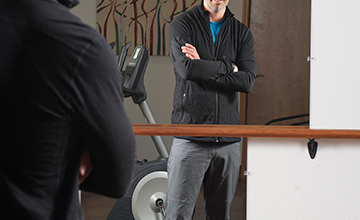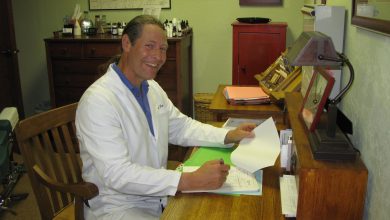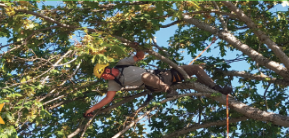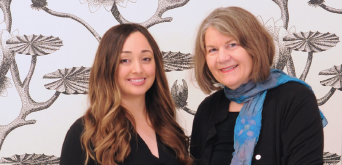Ethan Felcher Southern Oregon Alternative Medicine
Currently in the state of Oregon marijuana is legal for individuals seeking to use it for medicinal purposes. In order to legally possess marijuana
the individual needs to hold a state-issued Medical Marijuana card which then entitles them to certain rights and usage. In an ideal world patients
would get a prescription from their local practitioner then head over to the local pharmacy and pick up their prescription. Federal law however still
maintains that Marijuana usage even for medicinal purposes is considered illegal. This ruling has kept the bulk of physicians at an arms length
from issuing Medical Marijuna Cards. Ethan Felcher is the director of Southern Oregon Alternative Medicine’s Ashland office, located
at the corner of Lit Way and Ashland Street (Next to Printfast). The clinic is assists patients in receiving their own OMMP card.
I spoke with Ethan today to learn more about the process, rules, and regulations. He has been involved in the business for over 10 years and SOAM clinics serve Oregon residents at 9 different locations.
Hi Ethan, thanks for speaking with us today. Can you please introduce us to your business and share a little bit about what services you are providing to our community.
Southern Oregon Alternative Medicine is a clinic which helps patients get Medical Marijuana Cards from the state of Oregon. We provide medical marijuana friendly physicians for primary care and/or consultations for prospective medical marijuana patients. We also offer chiropractors and licensed massage therapists for ongoing care. All of this is geared toward patients looking for an environment which recognizes the medicinal and therapuetic value of marijuana.
Ethan many people have wondered if Southern Oregon Alternative Medicine is also a dispensary. Can you respond to this and how this applies to your business model?
SOAM is not a dispensary. We do not provide any medications of any sort to our patients. We are here to provide patients with OMMP friendly medical practitioners, not medicine.
What criteria do people need to meet to qualify for a medical marijuana card?
The state provides a list of specific conditions (such as chronic pain, muscle spasms, nausea) and diseases (such as AIDS, cancer, epilepsy) which qualify you for an OMMP card. This is why the state requires an M.D. evaluation to determine if a patient qualifies based on their medical history.
Has anyone ever been denied a card and or how do you prevent abuse of the card being misused?
Occasionally people are denied cards. Typically, this is due to incomplete paperwork rather than because someone doesn’t qualify. Once the paperwork is fully and properly completed, the State has only a few specific reasons for denying the patient an OMMP card. The application process provides an adequate vetting of each patient by a licensed doctor. This is done by requiring ongoing medical care and yearly re-documentation. As for abuse, someone would need to be wiling to lie repeatedly and convincingly year after year. Obviously, this can and does happen, but it is quite uncommon, as most people are uncomfortable with that level of deception.
On the phone you mentioned that your organization has worked with all ages of people and also worked with individuals who were originally vehemently against the use of medical marijuana.
As medical problems are universal, we see an extremely wide variety of patients, both in age and personality. Sometimes there are individuals who previously had been opposed to any use of marijuana, whose minds have been changed. This is always an unfortunate occurrence because it only happens in awful circumstances (such as someone contracting cancer). Then marijuana is found to be the only thing that makes coping with the disease or debilitating condition possible.
So, how are individuals going about getting the access they need?
This is one of the biggest issues facing patients. Access to medicine is entirely the patient’s responsibility. This means that they either have to grow it themselves, or find someone willing to grow it for them. Without legal dispensaries the only market where one can purchase marijuana is the black market. This can obviously makes it very difficult for some patients to get the medicine they need.
Do you receive referrals from outside practitioners who feel a patient should have a card but are unwilling to write the recommendation themselves?
Not usually. If a doctor is open discussing and advocating marijuana use for a patient, then that doctor is probably willing to sign the Physicians Statement. We see patients who’ve been denied by their primary care physician when an OMMP reccomendation was requested. We see patients who were simply afraid to even ask their family doctor for fear of being dropped as a patient. We also see patients who have never established a primary care relationship with any doctor.
Can you talk about fears that practitioners have in writing their own referrals and how have you seen this change over the past 11 years?
When SOAM first started, the number of doctors willing to reccomend medical marijuana were few. For example, some doctors wouldn’t even sign the official paperwork, they would attach a separate letter stating that they didn’t advocate marijuana use but didn’t want to prevent the patient from making that choice. Now, those same doctors are comfortable signing the official OMMP Physicians Statement from the DHS.
Are there currently in guidelines in place or in the works for how to administer medical marijuana once it reaches the patients hands?
No. As with access, this is something left entirely up to the patients. There is word of mouth between patients but nothing official. This is something that goes hand in hand with the lack of dispensaries. Even if there were actual guidelines with respect to the method and amounts as related to specific issues, patients are limited to what they or someone they know can produce. What this means, for example, is if you have chronic arthritis, and a topical application of cannabis creme would be most beneficial method of administration, unless you can go buy it, you would have to know how to actually make it yourself.
What currently is the cost of a card and how long does it last?
The state fees vary depending on the situation. The normal cost is $200 per card. If you receive OHP or food stamp benefits the cost is $100. If you receive SSI (Supplemental Security Income) the cost is $20. There is always an additional $50 fee to register someone other than the cardholder as a grower. The card must be renewed on a yearly basis, and the fees are due each time, as well.
What rights / benefits does an owner of an OMMP card hold?
An OMMP card allows the holder to grow up to six marijuana plants and possess up to 1 1/2 pounds of dried marijuana. It protects you from state prosecution for growing and possession as long as you are within the legal limits.
It is my understanding that once you have a card you must continue to maintain active medical records which demonstrate
you are taking additional matters to support your well being. Can you tell us about this?
The State does require that your medical conditions are chronic, and that you have current records, meaning a year or less old, to demonstrate that fact. This does mean that cardholders have to make regular visits (at least once a year) to their practitioners.
Ethan, give us some examples of where someone would be suffering long after medical care has been administered and has benefited from having OMMP?
One example would be a patient who, as a child, shattered his right elbow on two separate occasions, as well as severing a tendon in the same arm. This childhood trauma and the multiple surgeries that followed resulted in his having a limited range of motion in his arm and one finger, as well as very painful muscle spasms. Being an OMMP cardholder lets him legally use marijuana, which lessens the severity and frequency of the muscle spasms. I have known a patient who was diagnosed with Lou Gehrig’s disease and given less than a year to live. On his daughter’s advice he tried marijuana. Six years later I met him applying for his OMMP card and the disease had apparently not progressed, which he attributed to marijuana. The card allowed him to stop worrying about the potential of getting arrested over what he considered a life saving medication.
What about uses of Medical Marijuana for cancer patients?
That would most commonly be for combating the nausea and lack of appetite caused by the chemotherapy. Currently marijuana is only allowed as a symptom suppressor for a problem that has already manifested. Several newer studies have demonstrated marijuana’s potentially remarkable effectiveness as a cancer preventative.
Can you walk us through the process of coming in and getting a card with your organization?
It’s really basic. If you have a current health care provider, our doctor simply needs to review your medical records and have a consultation with you. Based on that he can determine if you qualify and if so, will sign the required Physician’s Statement. If you do not have current records, we can schedule an appointment(s) with one our practitioners. Then the process proceeds as above. Finally, we will make sure that you understand the State requirements and that your paperwork is correct, so you are not denied on a technicality.
Finally any last comments to our readers?
We are happy to answer any questions or concerns you may have. Feel free to call or stop in to the office. We are open M-F 10am-5pm.
Learn More:
Southern Oregon Alternative Medicine
Ethan Felcher
Address 545 Lit Way Ashland, OR 97520
Phone 541-482-8386




